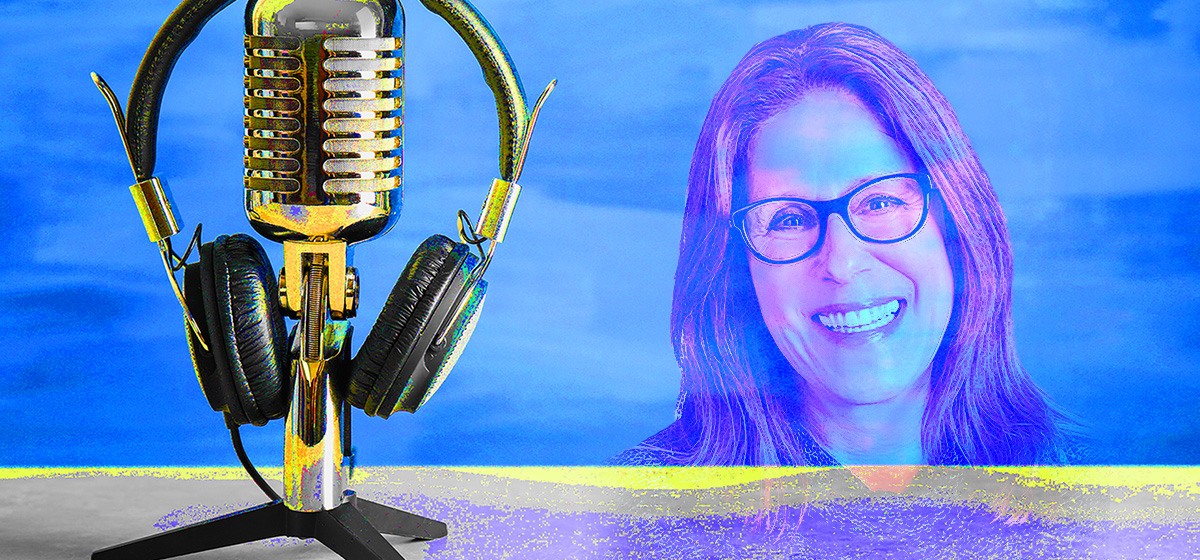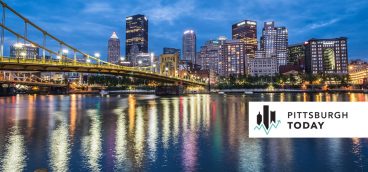Pittsburgh Tomorrow Podcast: Audrey Russo, President and CEO of the Pittsburgh Technology Council

Donald Bonk interviews Audrey Russo, president and CEO of the Pittsburgh Technology Council, as part of the Pittsburgh Tomorrow podcast series. The transcript is abridged and edited for clarity.
View the episode archive here. Read Audrey Russo’s full bio here. View her LinkedIn profile here.
“It would be creating a culture of zero tolerance for crime… I happened to have learned the notion of zero tolerance in terms of safety from working under the leadership of Paul O’Neill (former CEO) at Alcoa… And I thought, if you can’t create safety, how can people work? How can people thrive?” —Audrey Russo
Donald Bonk: I’m Donald Bonk working on the Pittsburgh Tomorrow Project for Pittsburgh Quarterly magazine. We have here today Audrey Russo, president and CEO of the Pittsburgh Technology Council. We’re at their headquarters here on the North Side in Pittsburgh.
We want to put things in context, so we thought we’d ask a little bit about your backstory so that folks who might have seen you doing great things in Pittsburgh can know a little bit about how you got to Pittsburgh.
Audrey Russo: I actually got to Pittsburgh in 2001. I was leading technology for a company called Reynolds Metals that was acquired by Alcoa. I’m originally from New York. I’ve moved around different places. But coming from Richmond, Virginia, I was thrilled to be in Pittsburgh.
And this was not like at the peak of wonderfulness in terms of Pittsburgh, but what struck me during our corporate tours and the opportunities to work with Alcoa were some of the neighborhoods. Landing in Squirrel Hill felt really like home and very inclusive to me. And I didn’t have that when I lived in Virginia and other places that I’ve lived other than when I was raised in New York.
Bonk: So Squirrel Hill was a welcoming place—a place that you felt comfortable—and where you felt that you could build a life?
Russo: I totally felt like I could build a life with my daughter. I felt that everything was accessible, that there was a blended community, that there were people that spilled over from the universities that lived there, that there were all different kinds of people. And the fact that I could walk to the grocery store and I could walk to the movie theater took me to a place that was very, very special. Now, mind you, it wasn’t at a height of innovation like what we see right now, even though there were things happening.
I began to feel like Pittsburgh was home. It was easy. It was warm. It was interesting, the density of really incredibly smart people that I was surrounded by and people that really cared and had a pride that I hadn’t seen before. There is a Pittsburgh pride that sort of proliferates no matter what community you live in. That was really surprising to me. And it was, in a simple way, just sort of heartwarming.
But I felt this word that’s today totally misused and underapplied is inclusivity. I felt that from the friends that I made, the people that I encountered and the troubles of the neighborhood, both positive and negative, meaning troubles of what does it mean to have growth? What about schools failing? What about what’s happening with crime? What about innovation? Neighborhoods that are still falling apart? They talked about it. They cared. They wanted to be involved. I didn’t see that everywhere, and I felt that here. So I felt that I was a part of something that was larger than myself.
Bonk: That’s really helpful to contextualize why you have so much passion and energy around Pittsburgh. And it starts at a very personal level.
Russo: Then I had a chance to work at a company called Maya Design. That was in 2005. I said, “There really is something happening here.” I could see it. It was a visceral kind of feeling. I was around people who wanted to make a difference, even though we still felt the bleeding—the bleeding of people leaving, people saying we didn’t have what it took to make ourselves an amazing city, and that people were going because of the weather, because of the air, because of lack of opportunities.
I saw the possibilities. I was so grateful when I was called and recruited to take the job that I’m in right now. And that’s probably why I’m still in the role that I’m in, because I do have a front seat to not only just the work, but also the ability to catalyze and connect and facilitate both locally and globally, the whole story about Pittsburgh.
Bonk: In your role as president and CEO of the Tech Council, can you give us a quick up and down about what you do either on a daily basis or in general?
Russo: Our objective is to make sure that southwestern Pennsylvania is an amazing place and a lucrative place for tech companies and innovation to be here, to build their company, to take it to the next level, to start something from nothing. So that means that we get involved in working with my colleagues who are at Carnegie Mellon, or Pitt, or any of the other universities and colleges who are trying to make sure that the region has the right pipeline for talent.
And also making sure that southwestern Pennsylvania is an amazing place for people to live and to work. That can take the shape of, at the federal level, immigration reform. We educate a whole lot of people here who are not from this country and really want to stay. Those are things that are really near and dear to the work that we do at the Tech Council.
We also work on making sure that companies, both large and small, are connected across innovation. Innovation can mean a product. It can be a company. It can mean investment. It can mean strategic partnerships. It can mean working with the universities to create sort of the next iteration of a company, of an idea, of a business. We can never be a great city if we don’t have this strong and very overused word: business ecosystem. The business ecosystem has to be something in many ways that’s ubiquitous. We have missing pieces of that ecosystem. And that’s what we’re working on.
Bonk: So, you’re kind of a switching station or a matching partner. You’re gathering information, connecting companies with one another, connecting resources and the universities—you’re like this crossroads.
Russo: That’s a good way to say it. We also work on visibility and storytelling, just like you and I are sitting here now telling stories. There was a time when people would say to me 10 years ago, “There’s no tech or innovation here. How could that be? What are you talking about?” And I said to my team, “Wait a second. There are amazing stories here. We need to tell them. We need to tell them to Pittsburgh.” Now, we no longer just tell them to Pittsburgh. We tell those stories to the world.
So to see that sort of transition from over a decade has been, again, part of the excitement in terms of the work that we did.
We also help companies with talent. As I mentioned earlier, it’s hard to keep people here who are not born here. So how do we help facilitate that and start to tell the narrative to the world so people can see the opportunities?
It used to be that if you want to go work at one company, and if you came to Pittsburgh, you’d look around town and say, “There’s no where else for me to work. If anything happens, I’m a one trick pony and I’ve really got to uproot myself and go somewhere else or start over.” Now, that’s not the case. At least now we’re seeing the growth of companies in artificial intelligence and machine learning and robotics.
If you’re a roboticist, you have lots of opportunities. If you’re in artificial intelligence, if you’re in data analytics… You start to see that. I would not say that we we’ve arrived; I’d say we’re still on that journey. But ten years later, I think we we’ve moved the needle.
Bonk: So numerically, mathematically, there are richer options. We could have even more, and that’s a goal. But we’re on the right track.
Russo: We’re on the right track. However, we also are struggling with population. We’re struggling with a slight decline. We can talk for a long time about what that means, that people are living longer, people are dying, the younger generation isn’t reproducing as many kids… but the point is, we have to have growth. We have to have growth because we need that for the airport. We need that to have connectivity. We need customers, and customers are people.
Bonk: Now I want to move on to the focus of Pittsburgh Tomorrow. We’ve talked to a number of community leaders and thought leaders and really want to hear your perspective. One of the questions that we’ve been asking folks is what specifically would make Pittsburgh the best city in the world or one of the best cities in the world?
Russo: Well, everyone’s competing to be the best city in the world. Let’s just say that everyone’s trying to either replicate Silicon Valley or figure out ways to be some sort of urban core. And I like to say we’ve got to do something so different and not copy. Pittsburgh has an opportunity not to copy. Sure, we can benchmark, but there are a couple of things.
One is that I’d like Pittsburgh to be a place where we think of work and the future of work. Jobs change often. And when they change often, it’s really hard to start thinking about how you matriculate young people through academic institutions. What are the careers? What are the options and how do they have a viable kind of livelihood?
I would like to see every company ensure that, every year, they start supporting internships with children and young adults starting in eighth grade. Everyone has an opportunity that’s embedded. So the cost of doing business in Pittsburgh, when you come, you know that you’re going to take a student. And that student may be with you for the entire time that they’re in high school or you may rotate, but that you make a commitment.
Many people may say, “Oh, that’s ridiculous. There are laws that prohibit that. You know, we work in dangerous environments.” I would say, figure it out. Figure it out.
Bonk: Basically, you want to provide young people the ability to be aware of, and know about, and be able to be articulate about how the city functions through these businesses, but also to aim higher and aim sooner at understanding the world of work and responsibility for themselves.
Russo: I’d also like to be known that every young child, by the time they graduate high school, has been outside of the country and has an international awareness. I’m not talking about going fishing in Canada and I’m not talking about vacationing in the Caribbean. I’m talking about one experience and that we’re committed to that. And when every student graduates, we have created a citizen of the world.
It’s hard to be a competitive global city if you don’t have people that understand the world around them.
Bonk: So, putting younger people in the workplace and getting them out of Pittsburgh at least to experience the outside world so that if they come back, they have a different perspective on what Pittsburgh can be.
The next idea that we explore a little bit is the moonshot idea. If you had one big idea, one transformative change to the narrative of Pittsburgh, that you could share with the audience, what would it be?
Russo: It would be creating a culture of zero tolerance for crime—heinous crimes like homicide and violent crimes—and that we as a city have zero tolerance. I happened to have learned the notion of zero tolerance in terms of safety from working under the leadership of Paul O’Neill (former CEO) at Alcoa. There’s a term that you “get woke.” I really “got woke.” And I thought, if you can’t create safety, how can people work? How can people thrive?
I don’t want to get into Maslow’s hierarchy of needs and start to draw some of those examples, but honestly, if you’re living in an environment that is not quote-unquote safe, it’s probably pretty hard for you to have a life of meaning and look towards the future and think about possibilities. So, to me, that would be bold. That would be exciting because we would all become part of the fabric of all the neighborhoods and the entire community.
The practical way of implementing that is that I have a dream that we would pause as a city when someone dies of a homicide. Immediately, we stop; We ring the bell for their age. We share information to every single media outlet, and we take it seriously in terms of how we support the family, and that it is not just a name, and it is not just a number. I think if we did that over a period of time, it would become part of our fabric and a part of that narrative change. The narrative would be that we have zero tolerance. It wouldn’t be pointing the finger; It would be embracing and figuring out ways for change.
Bonk: That is a moonshot idea. And that’s pretty powerful and transformational. Lastly we want to go to a question. I saw this in a meme and it really stuck with me. The year 1990—which I remember pretty well—and the year 2050 are equidistant, thirty years in either direction. Bringing that down to a practical level, what are three ideas that in this next three decade span you think would be really a good thing to put forth in Pittsburgh?
Russo: Well, one: It’s about music, that we really become a destination. We become Pittsburgh as a destination for not just good restaurants, but for music. How is music embedded into the fabric of the life of people who live here? So, again, I’ve done a whole bunch of benchmarking in terms of other cities like Nashville. You take a city like Nashville that’s growing almost 80 people a day.
Do I want that for Pittsburgh? No. What I want for Pittsburgh is a steady, diversified uptick. And I feel that that’s really manageable and it also builds on our assets. We understand the issues around infrastructure in a much more deliberate way. I would like to see us work on our music scene.
You know, we think about how Seattle had the grunge and how Austin had country music. And you look at those cities, and we peel it back, and you say, “That really was the beginning of those cities’ transformation.”
What we had here in Pittsburgh is outside of New York City in the ’40s and ’50s was “the scene.” Everyone made a stop in Pittsburgh. That was in jazz. The black community was strong and they were strong in their music. They were strong in the arts and they were strong in terms of being known around the world. And we lost that. I have a dream of resurrecting that. Maybe there’s a genre that we don’t even know about right now that has not been captured.
What we’re really good at here in Pittsburgh is looking backwards and holding on to the past. But how do we re-knit that so that it becomes something really known for in the future? I think we have an opportunity with the Warhol. I think we have an opportunity with the Mattress Factory. I think there are things that are sitting here right now that are still ripe for opportunity for all those kinds of collisions and connections.
Bonk: Any other thoughts on that on the 2050,1990 span?
Russo: I’d like to see no cars. I’d like us to really take this autonomous vehicle work that’s going on right now. It’s just incredible. And they are focused on safety. They’re focused, obviously, on every piece of development and technology and logistics. I’d love to have days where there are no cars and only autonomous vehicles that come into the city proper, particularly in downtown.
I don’t like that we very often get ranked as an unhealthy city. And whether that’s the air quality or whether that’s just being overweight and not having activity. In Colorado, 86 percent of everyone there is involved in something healthy. I’d like us to be known for that. And I think that if we start to shift in terms of the cars and autonomous vehicles and having the right transportation, I think it will force us to shift.
There is a new way to live. Chatham is trying to build a sustainable environment for people who are older where people share in Eden Hall in the North Hills. That’s really exciting. I’ve read it and I thought that’s really fabulous. People many times are not close to all their family, but they can build a new family in an environment where it’s building upon sustainability, reuse, collaboration—a collective lifestyle.
Bonk: Any last thoughts for us?
Russo: It’s interesting to think of 2050. It’s going to happen in no time. It’s going to whip right by. I think the opportunity for all of us is to sort of align in a couple of things and a couple of ways. And what might those ways be? I don’t know, but I can tell you that it will definitely be around autonomy. It will be around artificial intelligence. It will be around making sure that people don’t do jobs that are unnecessary for humans to do. Thanks for the opportunity.
Bonk: We’ve gotten a peek into 2050 and beyond. Thanks very much, Audrey. We really appreciate your time today, and I look forward to talking with you more about these wonderful ideas about this big future.





